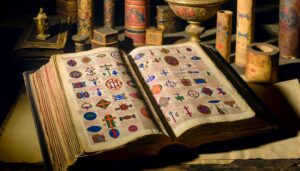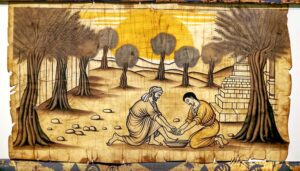Isadora Meaning In The Bible: Divine Gift and Origin
The name Isadora does not appear in the Bible and lacks direct biblical significance. Derived from Greek elements ‘Isis’ (an Egyptian goddess) and ‘doron’ (meaning gift), it translates to ‘gift of Isis,’ reflecting Greek and Egyptian cultural syncretism during the Hellenistic period.
While Isis symbolizes attributes like motherhood and magic, paralleling biblical maternal figures, the name Isadora itself is rooted more in ancient mythologies than in biblical texts. This etymological context highlights the blending of cultural and religious traditions, offering a nuanced understanding of its historical and spiritual dimensions.
Continue exploring to discover deeper insights into this name’s intriguing background.

Isadora Meaning in the Bible: Origin, Symbolism, and Interpretation
| Aspect | Details |
|---|---|
| Name Origin | Greek (Isidora) |
| Meaning | Gift of Isis (pagan origin, later Christianized) |
| Biblical Presence | Not directly mentioned in the Bible |
| Christian Context | Associated with virtue, grace, and divine gift |
| Symbolism | Represents a spiritual gift or divine blessing |
Etymology of Isadora

The etymology of the name Isadora can be traced back to its Greek origins, where it is derived from the elements ‘Isis,’ the name of the ancient Egyptian goddess, and ‘doron,’ meaning gift. This combination translates to ‘gift of Isis,’ reflecting a syncretism between Greek and Egyptian cultures.
The name embodies reverence and devotion, indicating a bestowed favor from a deity. It is important to note that while the name itself is not directly referenced in biblical texts, its components hold significant mythological and cultural weight.
The incorporation of ‘Isis’ suggests an ancient respect for divine power, while ‘doron’ conveys a sense of valued offering. This enhances its interpretative richness when considered within broader historical and theological contexts.
Historical Context

In examining the historical context of the name Isadora, it is crucial to contemplate the cultural and religious dynamics of the Hellenistic period, where Greek and Egyptian traditions intermingled extensively.
This era, spanning from the conquests of Alexander the Great to the rise of the Roman Empire, fostered the amalgamation of deities and religious practices. The name Isadora, meaning ‘gift of Isis,’ reflects this syncretism, as Isis was revered in both cultures.
| Aspect | Greek Influence |
|---|---|
| Religion | Polytheism with anthropomorphic gods |
| Language | Spread of Koine Greek |
| Culture | Emphasis on philosophy and arts |
| Governance | City-states evolving into Hellenistic kingdoms |
Understanding this context provides insight into how names like Isadora carried significant cultural and religious connotations.
Isis and Biblical Connections
Exploring the connections between Isis and biblical traditions requires a nuanced understanding of how ancient Egyptian religious influences permeated early Judaic and Christian thought.
The goddess Isis, emblematic of motherhood, magic, and fertility, held a significant place in Egyptian religion and her attributes subtly echoed in biblical narratives. Early Judaic texts, while distinct, occasionally reflect themes prevalent in Egyptian mythology.
For instance, the nurturing aspects of Isis parallel depictions of maternal care in biblical figures like Mary. In addition, the syncretism observed in Hellenistic periods allowed for the blending of deities into new theological interpretations, potentially influencing early Christian iconography and doctrine.
These intersections underscore the complex interplay between cultural myths and religious evolution in antiquity.
Symbolism in Ancient Cultures

Symbolism in ancient cultures served as an essential mechanism for conveying complex religious, social, and philosophical ideas through imagery, rituals, and artifacts. These symbols were not mere decorations but integral components of cultural identity and spiritual practice.
For instance, the Egyptians used hieroglyphs and divine iconography to communicate theological concepts and societal norms. Similarly, Mesopotamian cultures embedded myths within their art to represent cosmological beliefs and moral values.
In the biblical context, symbols like the Ark of the Covenant and the menorah encapsulate divine presence and guidance. These symbols transcended their material form, providing a tangible connection to the metaphysical and ethical frameworks that governed ancient life.
Understanding these symbols offers profound insights into the collective psyche of these civilizations.
Modern Interpretations

Modern interpretations of ancient religious symbols often reflect a blend of historical analysis and contemporary cultural perspectives, offering new dimensions of understanding and relevance.
The name ‘Isadora,’ while not explicitly mentioned in biblical texts, can be explored through various modern lenses to unearth its potential significance. Scholars and theologians may approach the name by examining its etymological roots and cultural contexts.
- Etymology: Derived from Greek, meaning ‘gift of Isis,’ linking it to ancient Egyptian religious traditions.
- Cultural Integration: How the name has been adopted and adapted in different Christian contexts.
- Symbolic Resonance: Potential spiritual meanings associated with the name in modern faith communities.
These interpretations foster a deeper appreciation for how ancient names like Isadora can be meaningful today.
Conclusion
The convergence of the name Isadora from its ancient Egyptian roots to its scant biblical mentions reveals a rich tapestry of historical and cultural intersections.
This coincidence of origins and symbolism highlights a profound connection between ancient deities and biblical narratives, suggesting a shared human quest for meaning and transcendence.
Such intricate interweavings evoke a sense of wonder, underscoring the timeless human endeavor to find coherence and significance across diverse spiritual landscapes.






